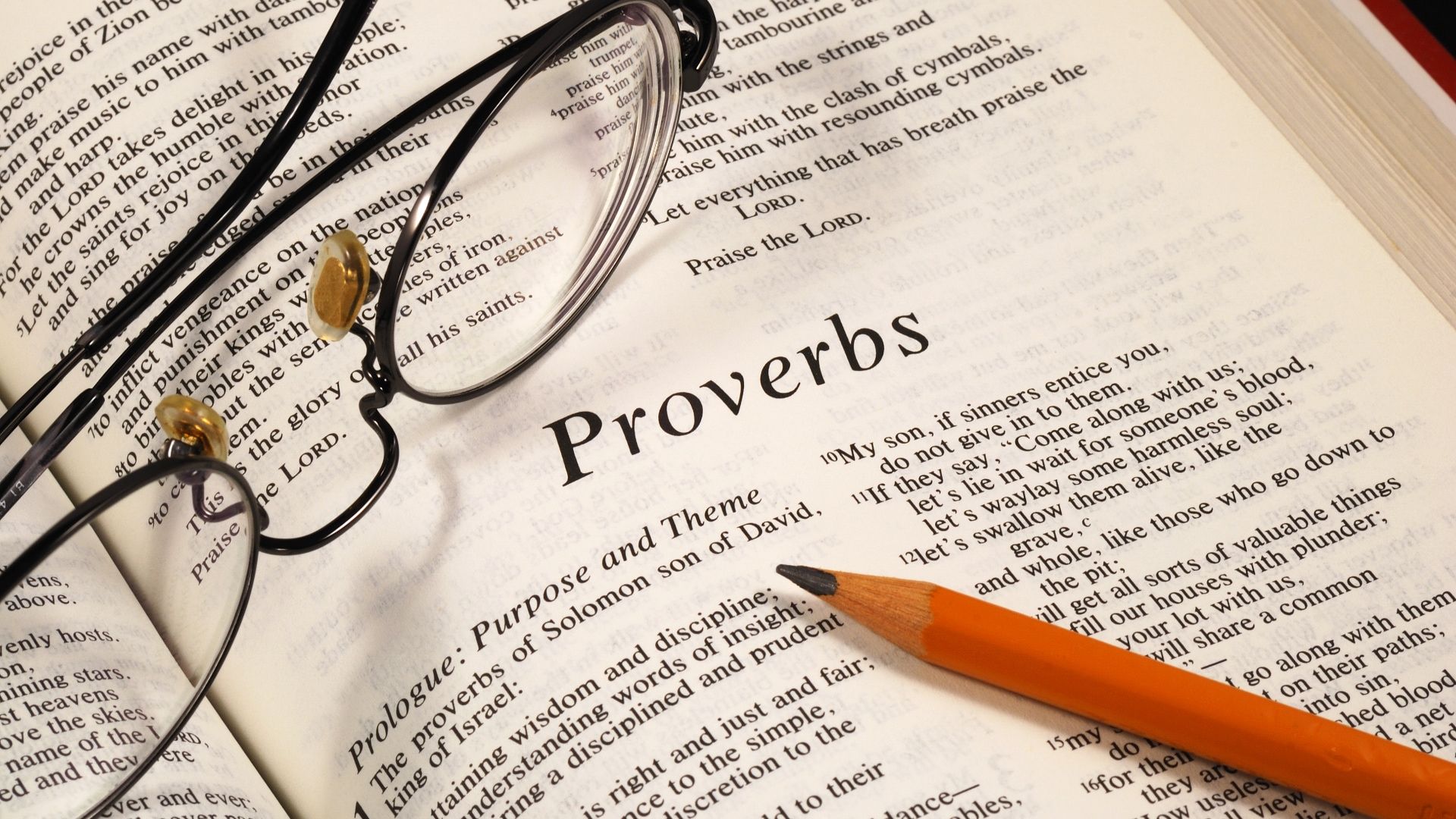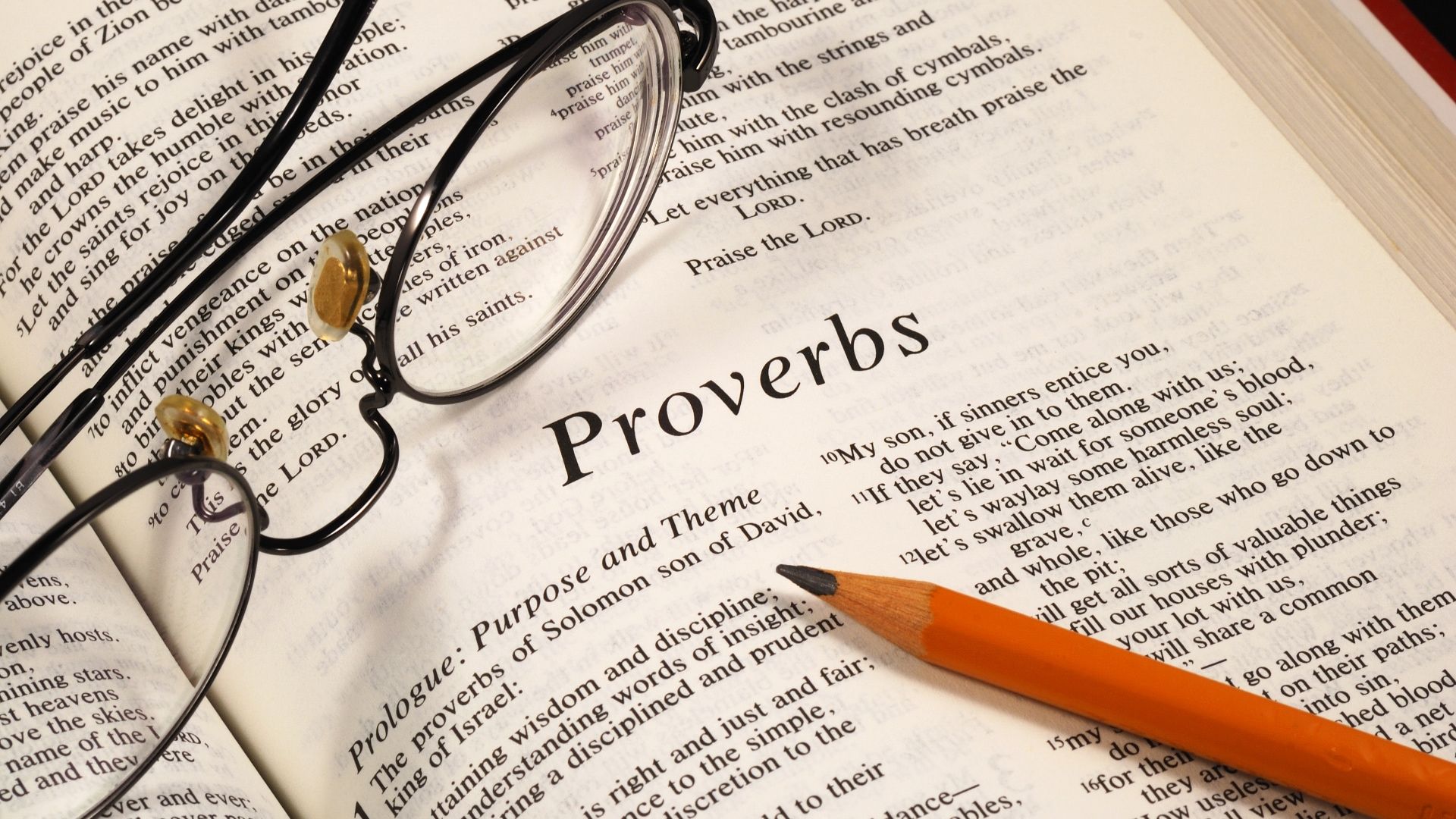Envy (Proverbs)

I'd like to ask you to think for a minute about what you desire the most in your life. It can be anything: a better house, career success, an achievement, popularity, marriage, children, a comfortable retirement. But for everyone here, there is something that you think about, that you're working towards, that gives your life some meaning. As someone has said, "There is woven inside each of us a desire for something more – a craving to be part of something bigger, greater, and more profound than our relatively meaningless day-to-day experience" (Paul David Tripp, A Quest for More).
I'll give you an example. Remember Rocky, the first one way back in 1976? When Adrian, his girlfriend, asked him why he trains so hard, beating up meat in the freezer and running up those stairs in Philadelphia, Rocky answers, "I just want to go 15 rounds cause then I'll know I'm not a bum." There is something in your life that you are striving towards. It gives you identity, and if you attain what you're hoping for, then you know you're not a bum.
So can everyone think of something that you desire most in life? It should be fairly easy to identify. It's what gets you up out of bed in the morning. If it's a house, then it's what keeps you looking at the real estate section of the paper every time it arrives. If it's a career, it's what keeps you working so hard. It's whatever it is that you start thinking about when you lie in bed at night. It makes your daily life more bearable. You know you can make it if you reach your dreams in that area.
Now you may feel like I'm setting you up here, that I'm about to say, "Shame on you for wanting to live for something bigger than yourself." But actually, the desire to long for something transcendent in your life is God-given. You were meant to live for something bigger than yourself.
But there's a danger that goes along with this desire. That danger is envy. Envy is an attitude of discontentment, a consuming desire to have something that somebody else has that we don't. Jonathan Edwards defined envy as "a spirit of dissatisfaction with, and opposition to, the prosperity and happiness of others as compared with our own."
So I'd like to take whatever it is in your life this morning that you really desire, and to do some heart surgery on all of us this morning. Three questions: where do I envy? What's so bad about envy? And what do I do about it?
1. Where do I envy?
The reason I ask where you envy is that envy is one of those hidden sins that is very hard to detect within ourselves. We're not even aware that we're doing it most of the time. But Proverbs gives us two tests to see where it is that we envy.
The first test is what we're wearing ourselves out to get, what we have to have at all costs. Proverbs 23:4 says, "Do not wear yourself out to get rich; do not trust your own cleverness." If there is something that you just have to have, that you are wearing yourself out to get, that you must have at all costs, then it is something that you envy.
In fact, the Hebrew word for envy in the Old Testament is interesting. Proverbs 23:17 says, "Don't let your heart envy sinners." The word envy there literally means to be jealous or zealous for something. It describes a passionate and intense desire for something. It's not always a bad word. You can be passionate and zealous for a good thing. But we're going to see in a minute that the zeal and passion can be misdirected, and this passion and zeal can turn into something negative that we call envy. If you want to figure out if you have envy in your life, you need to ask yourself what it is that you are passionate about, what it is in your life that you intensely desire. Those who know you well could probably help you figure this out, because it's often obvious to other people, even if it isn't to you.
The second test that Proverbs gives us is to ask: what is it that other people have that I would like? So all throughout Proverbs, we read things like: "Do not envy the violent" (Proverbs 3:31). "Do not let your heart envy sinners" (Proverbs 23:17). "Do not envy the wicked, do not desire their company" (Proverbs 24:1). "Do not fret because of evildoers, or be envious of the wicked" (Proverbs 24:19). The idea is that we will be tempted to look at what other people are enjoying, and it will drive us crazy because we're not enjoying the same things. It will especially drive us crazy if we are trying to live a life that is pleasing to God, and they are not, yet they are enjoying benefits that we don't get to enjoy.
The best example of this may be from the film Amadeus. Mozart's contemporary, Antonio Salieri, prayed as a young man, "Let me make music that will glorify you, Father. Help me lift the hearts of people to heaven. Let me serve you through my music."
God didn't answer that prayer. Salieri never became that great musician. But Mozart did. Mozart dazzled the crowds, playing music as if it was second nature to him. His melodies were complex and fun all at the same time, songs that soared till they seemed to bring heaven right down to earth. Yet Mozart was an obvious sinner. He was immature, vulgar, and obscene. He made off with the ladies every chance he could get. Salieri never understood why God chose to give Mozart extraordinary gifts and not him. He envied the wicked, and it drove him crazy.
The psalmist confessed in Psalm 73:
But as for me, my feet had almost slipped;
I had nearly lost my foothold.
For I envied the arrogant
when I saw the prosperity of the wicked.
They have no struggles;
their bodies are healthy and strong.
They are free from common human burdens;
they are not plagued by human ills.
(Psalm 73:2-5)
You'll recognize this in your own life by when you hear good news about somebody else. You went to school with someone, and you hear that they just got a big promotion, or moved into this huge house on the Kingsway, or that they're incredibly rich. In most of our hearts we don't react to news like this with unbridled happiness for them. We're a little sad, and we think, "Why couldn't that have been me?"
We recognize envy two ways in our lives: by our intense desires, and by the times that we want what other people have for ourselves.
This leads us to the second question I want to ask this morning:
2. What's so bad about envy?
I hope you've recognized that all of us have envy in our souls. It's incredibly hard to detect in our own lives, but the reality is that it's a temptation to all of us. You may be thinking, "What is the big deal about envy? What's the problem?" Some argue that envy is good, that it is the driving force behind democracy and capitalism. On the other hand, envy is listed as one of the seven deadly sins by the historic church. Proverbs gives us quite a few reasons why envy is wrong. In fact, it's a danger to our souls.
One of the problems with envy is that the object of our envy is too small, too fleeting, to really take the place of affection that it has in our souls. Remember that I said that you were meant to live for something bigger than yourself? You were, but most of what we envy is ridiculously small. In the recent movie Juno, the stepmother of a pregnant teenager yells out in frustration, "When you move out I'm getting two Weimaraners!" The teenager sarcastically replies, "WHOA DREAM BIG!" But that's a lot like us. We were meant to live for something much larger than ourselves, but most of us settle for envying something much too small to really fill our souls.
Proverbs 23:4-5 says:
Do not wear yourself out to get rich;
do not trust your own cleverness.
Cast but a glance at riches, and they are gone,
for they will surely sprout wings
and fly off to the sky like an eagle.
The writer says that something like wealth can become an all-consuming purpose in life, but it can lead to frustration, because they can disappear so quickly. The same goes for pretty much anything that we long for. If you long for youthful looks, then you're longing after something that's fleeting. It's a losing battle. If you long for popularity and acclaim, then it's only a matter of time before someone else is more popular than you are. A lot of what we envy is just another version of wanting two Weimaraners. It's not really a big enough desire. We're settling for something too small for our souls. Paul Tripp writes:
We were never meant to be self-focused little kings ruling miniscule little kingdoms with a population of one. Sure, it's right for you to care about your health, your job, your house, your investments, your family, and your friends. It would be irresponsible for you to act as if none of these things mattered. Yet it is a functional human tragedy to live only for these things. It is a fundamental denial of your humanity to narrow the size of your life to the size of your own existence, because you were created to be an "above and more" being. You were made to be transcendent. (A Quest for More)
The other problem with envy is that it is destructive. It destroys and consumes all who indulge it. Proverbs 14:30 says:
A heart at peace gives life to the body,
but envy rots the bones.
Jealousy destroys one's inner peace. It eats away at a person. It can actually have a physical effect. Envy has a destructive energy that decimates everyone who falls in its path. Envy is actually what turned paradise into, well, what we have today. Adam and Eve lived in the Garden of Eden, and envied the one thing they couldn't have, which is what got us into the mess we have today.
The story is told of a monk who lived in a wilderness cave. He was known far and wide for holiness, so much so that his reputation reached even to hell itself. So the devil took three of his most effective demons with him to tempt the monk out of his godliness. They found the monk sitting at the mouth of his cave, a serene look of contentment on his face. The first demon planted in his mind the temptation of great power, with visions of glorious kingdoms. But the monk's face remained serene. The second tempter planted in the monk's mind the temptation of great wealth, with visions of gold and silver and prosperity. But still the monk's face remained serene and contented. The third demon planted in his mind the temptation of sensuous pleasure, with visions of beautiful women. But the monk's face remained quiet and godly. Annoyed, the devil barked, "Step aside, and I will show you what has never failed." He strolled up beside the monk, leaned over, and whispered into his ear, "Have you heard the news? Your classmate Makarios has just been promoted to bishop of Alexandria." The face of the monk scowled.
You can have conquered all kinds of temptations, but if you give into the subtle sin of envy it will consume your soul. Envy, Proverbs says, rots the bones. There are other reasons we could look at in Scripture. For instance, envy destroys community. It's impossible to love and envy at the same time. But for now, let's stick with these two. Envy tries to get meaning out of something that is too small for our souls, and it ultimately destroys our souls.
One last question:
3. So what do I do about it?
What do we do about envy? Proverbs has two answers: worship, and eternity.
Proverbs 23:17 says:
Do not let your heart envy sinners,
but always be zealous for the fear of the LORD.
That term "fear of the LORD" is often misunderstood. It doesn't mean cowering or terror. It means worshipful awe, so much so that our awe of the LORD becomes the primary motivator of all that we think, desire, say, and do. It means that we get our primary meaning and identity from God and nothing else.
This verse gives us two kinds of passionate longing. It says, "Don't passionately desire what sinners have. Instead, passionately desire the fear of the LORD." In other words, exchange what you desire most in your life. It's only when you desire God more than you desire anything else that you are free. This is the essence of worship: attributing worth to God. Exchange your worship of lesser things for the fear of God, which is reverence and worship for who God is.
C.S. Lewis wrote:
To love and admire anything outside yourself is to take one step away from utter spiritual ruin; though we shall not be well so long as we love and admire anything more than we love and admire God.
When we worship God, we will no longer get our identity from anything or anyone else. Someone (Sam Storms) put it this way:
The prideful person is obsessed with comparisons, always measuring himself/herself against others. The proud person finds his identity in relation to someone he thinks of as a lesser (which encompasses just about everyone). The humble person finds his identity in relation to someone he knows is greater: Jesus!
The other way to conquer envy is eternity. Proverbs 24:19-20 says:
Do not fret because of evildoers
or be envious of the wicked,
for the evildoer has no future hope,
and the lamp of the wicked will be snuffed out.
Contrast this with those who fear the LORD, according to Proverbs 23:17-18:
Do not let your heart envy sinners,
but always be zealous for the fear of the LORD.
There is surely a future hope for you,
and your hope will not be cut off.
The psalmist combined the two ideas of worship and eternity when he talked about his struggle with envy in Psalm 73. What changed? "…till I entered the sanctuary of God; then I understood their final destiny" (Psalm 73:17). Worshiping God allowed him to desire God above the prosperity of the wicked. It also helped him to take the long view, and understand that he had a future and a hope that the wicked don't have. And then he concluded:
Whom have I in heaven but you?
And earth has nothing I desire besides you.
My flesh and my heart may fail,
but God is the strength of my heart
and my portion forever.
Those who are far from you will perish;
you destroy all who are unfaithful to you.
But as for me, it is good to be near God.
I have made the Sovereign LORD my refuge;
I will tell of all your deeds.
(Psalm 73:25-28)
Do you recognize envy in your life? The temptation is there in all of us. We will be tempted to long after things that really aren't big enough for our souls, and in the end it will destroy us. Envy rots the bones. The antidote is worship and eternity: to get our meaning and identity from God, not from lesser things; and to treasure him above all.
Let's pray.
You're meant to be dissatisfied. You're mean to long for more. You weren't meant to fill your cravings with things that can't fill your soul. We're far too easily satisfied.
Ungodliness is not just a set of sins. Someone's defined ungodliness as "finding fulfillment outside of God, which leads me to commit endless sins of the heart." We're supposed to long, but our longing is meant to be fulfilled in God, and in what he's bringing about in eternity.
I invite you to come this morning and repent of envy. The amazing thing about God is that while we were out envying after other things, God did not sit idly by as an unapproachable King. Instead, the King went to a cross so that he could welcome us as we are and change our idolatrous hearts into hearts that long for him. Jesus gave up his hold on life so that we could be free from the things that have a hold on us. I invite you to come to Jesus who died for you, and to worship him this morning.





